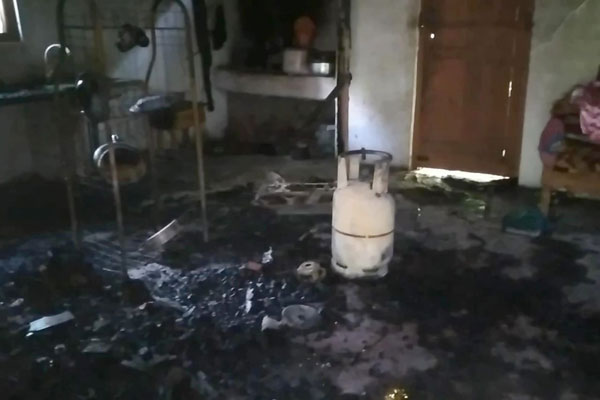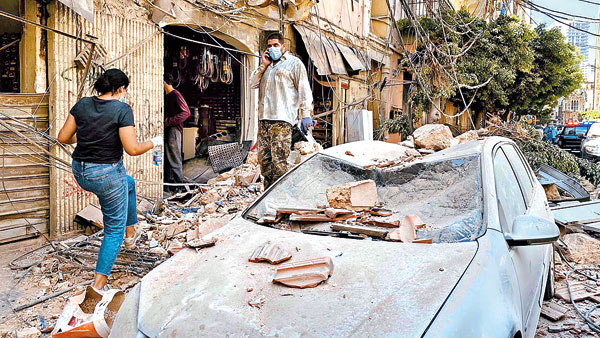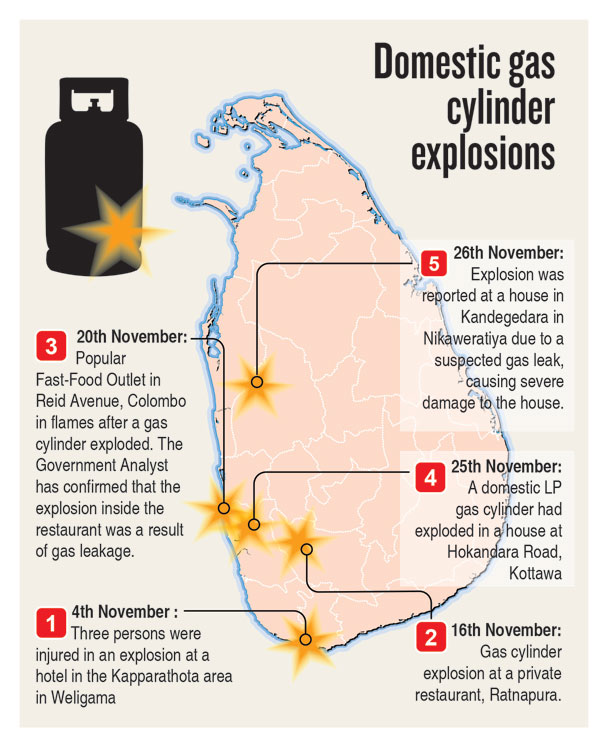News
Crisis over cylinders of gas: time bomb waiting to explode

The house in Nikaweratiya that was severely damaged by a blast. Pic by Anil Gamini Wijeratne
Gas cylinder importers have said they are confused at the series of gas cylinder explosions in the kitchens of houses or eateries, and alleged that sabotage may be the cause.
Importers said they were perplexed by the incidents that were too frequent to be a coincidence and there would be a full probe on the explosions.
Litro Gas company Marketing Director Janaka Pathiratne denied that the composition of the gas could be the cause for the explosions, claiming the gas sold in the market was in conformity to Sri Lanka Standards Institution (SLSI) specification.
He denied allegations made by former Consumer Affairs Authority Director Thushan Gunewardena, who claimed change in the composition of the gas was the cause for the explosions.
According to the Litro Gas company, it had in April this year introduced a 18-litre hybrid cylinder that weighed 9.5 kilograms. The cylinder had a higher ratio of propane gas, with 50% propane and was sold at Rs 1,395, the company said. The company claimed the new hybrid cylinder was highly fuel efficient and safe.
This was at the time gas importers were lobbying for a price hike on the domestic LPG gas cylinders. However, Litro withdrew the hybrid cylinders immediately following the green signal to increase the price of gas in August. Litro said all cylinders now had a composition of 70% butane and 30% propane.
“Anyone can check on the ratio of the content,” Mr Pathiratne said. The Marketing Director said Litro had more than 80% of the market share and it supplied around four million cylinders a month.
He said past records show that explosions did occur but they had been due to negligence of the users. Every year around 15 explosions took place but they had been phased out through the year. Most often the reasons were that gas users failed to change the gas regulator or the tube and/or were using substandard cookers.

Last year’s Lebanon port blast, caused by dangerous storing of ammonium nitrate, ripped through blocks of the city for miles around. The blasts injured over 5,000 people, claimed at least 220 lives and left 300,000 people homeless. (Pic:AFP)
“We suspect sabotage to discredit our business. We will investigate,” Mr Pathiratne said.
Meanwhile Laugfs Gas, the partner company in the gas market, also denied allegations that the gas was the cause for the explosions with its Chief Executive Officer W H K Wegapitiya denying the claims on national television.
SLSI said it had specifications for the cylinder pressure but not for the composition. SLSI Engineer M S S Fernando said the composition was being decided by the importers. “We need to have a request from a ‘body’ to introduce technical regulations,” he said.
However, former CAA Director Thushan Gunewardena said repeated requests to the SLSI to examine the composition of gas and to introduce standard specifications were ignored. “We even brought the matter before the Trade Minister and State Minister for consumer protection but little or nothing has been done. It is a time bomb waiting to explode,” he said.
He stood by his claim that the composition of the gas supply continues to be 50% butane and 50% propane and the cocktail was not appropriate for a tropical country, as the industrial gas propane had a four times higher pressure and tended to leak. He said the cylinders had not been designed to hold this composition, and called on the Government to intervene and rescue the people who had been misled into believing that the gas was efficient and safe.
“The gas company claims are baseless, and people may lose their lives,” he said.
In the meantime, the Government Analyst investigations on the sites of explosions had revealed that in all incidents the cylinders had remained intact. It was concluded that leaked gas coming in contact with an ignition spark hadcaused a fire.
Housewives said they feared having the gas cylinders inside their houses with some moving their cylinders from the kitchen to the back garden. “It is dangerous, too many explosions have been happening,” one housewife said.

In the past four weeks, five incidents of gas explosions had been reported raising safety concerns among families. On Friday in Nikaweratiya, a house was severely damaged by a blast. The explosion was suspected to be caused by a gas leak.
On Thursday in Pannipitiya, a house caught fire due to a gas cylinder explosion. The previous week at Reid Avenue in Colombo 7, a popular fast food outlet caught fire. On November 16 in Ratnapura, a restaurant caught fire because of a gas cylinder explosion.
On November 4 another explosion took place in a tourist hotel in Weligama.
The best way to say that you found the home of your dreams is by finding it on Hitad.lk. We have listings for apartments for sale or rent in Sri Lanka, no matter what locale you're looking for! Whether you live in Colombo, Galle, Kandy, Matara, Jaffna and more - we've got them all!

